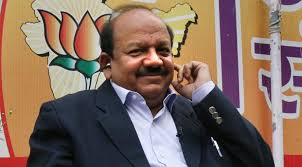
The decision was taken following the BJP's parliamentary board meeting attended by party president Rajnath Singh and senior leader L.K. Advani among others.


The decision was taken following the BJP's parliamentary board meeting attended by party president Rajnath Singh and senior leader L.K. Advani among others.

Thiruvananthapuram, Apr 16: Seven fresh cases of COVID-19 were reported from Kerala on Thursday, taking the total number of active cases to 147 in the state,even as over 88,000 people are under observation.
On Wednesday, only one positive case had been reported, thelowest in weeks.
While Kannur reported four cases, two were from Kozhikode and one from Kasaragod, Chief Minister Pinarayi Vijayan told reportershere.
Five of those affected had come from abroad, while two have got it through contact with infected people.
Samples of 27 people, including 24 from the worst affected Kasaragod, have turned negative on Thursday.
He said 394 coronavirus cases have so farbeen detected from the state.
Over 80,000 people are under observation, including 532 in various hospitals.
Vijayan said 17,400 samples have been sent for testing of which 16,459 have returned negative.

Jaipur, Jul 23: Four days after the Special Operation Group (SOG) sent a notice to Union minister Gajendra Singh Shekhawat in connection with the purported audio clips indicating his alleged involvement in horse trading of MLAs in Rajasthan, a city court has directed the Rajasthan police to probe a complaint alleging Shekhawat's role in a credit society scam worth Rs 840 crore.
The additional district judge Pawan Kumar, on Tuesday, directed the additional chief judicial magistrate's court to send the complaint against Shekhawat to the SOG.
Shekhawat, his wife and other partners have been named in the complaint in the Sanjivani Credit Cooperative Society scam in which around 50,000 investors allegedly lost about Rs 840 crore.
The Jaipur unit of the SOG has been probing the scam since last year after an FIR was registered on August 23, 2019.
Now, Jaipur ADJ Court-8 ordered a fresh inquiry in the case against Gajendra Singh accepting the revised application filed by Lagu Singh and Guman Singh and said that "this is a serious matter and hence SOG should investigate this".
Both the applicants had invested a huge amount in Sanjivani credit cooperative society.
It is alleged in the complaint that a multi-storey building has been built with the money instead of a theatre which was proposed earlier and many properties were also bought in Ethiopia with the money.
An SOG investigation also reveals that a large amount of money has been deposited into accounts of Shekhawat and his wife at different time spans, said sources.
Earlier, Shekhawat was not mentioned in the chargesheet filed by the SOG in connection with the case. Later, a magistrate's court also rejected the application to include him in the chargesheet. The applicants then approached the additional district judge's court with a revised application.

New Delhi, Jun 13: About 56 per cent of children were found to have no access to smartphones which have emerged as essential tools for online learning during the coronavirus-induced lockdown, according to a new study that surveyed 42,831 students at various school levels.
The study ''Scenario amidst COVID 19 - Onground Situations and Possible Solutions'' was conducted by child rights NGO Smile Foundation with an aim of analysing the access to technology.
The findings of the study showed that 43.99 per cent of surveyed children have access to smartphones and another 43.99 per cent of students have access to basic phones while 12.02 per cent do not have access to either smartphones or basic phones.
A total of 56.01 per cent children were found to have no access to smartphones, the study said.
"Concerning television, it was noted that while 68.99 per cent have access to TV, a major chunk of 31.01 per cent does not. Hence suggesting that using smartphone interventions for enhancing learning outcomes is not the only solution," it said.
At the primary level of education (class 1 to 5) 19,576 children were surveyed while at upper primary level (class 6 to 8) 12,277 children were surveyed. At secondary level of education (class 9 to 10) 5,537 children were surveyed and at higher secondary level (class 11 to 12) 3,216 children were surveyed.
The survey based on which the study was conducted used two approaches - over the telephone wherein the NGO reached out to the children whose database it already had -- students enrolled in various education centres of the NGO -- and second was through community mobilization wherein community workers went door to door to get answers.
The survey was conducted in 23 states, including Delhi, Gujarat, Maharashtra, Karnataka, Tamil Nadu, West Bengal, Andhra Pradesh, Telangana, Uttar Pradesh, Haryana, over a period of 12 days from April 16 to April 28.
The lockdown induced by the COVID-19 pandemic in March prompted schools and colleges to move to the virtual world for teaching and learning activities. However, many experts say the digital divide in the country may turn online classes into an operational nightmare.
As per official statistics, there are over 35 crore students in the country. However, it is not clear as to how many of them have access to digital devices and Internet.
Santanu Mishra, co-founder and executive trustee, Smile Foundation, said the findings clearly show that the digital divide is a real challenge, and multiple approaches need to be implemented to cater to all across the nation.
"As an exercise before we start any programme, we do a baseline study to understand the on-ground challenges so that our programmes can bring in real work and real change. With the onset of the pandemic, following indefinite school closures, it is more important than ever to understand the situation and how can we ensure that children are given quality education. Through this, we understand that customized modules need to be built in accordance with the channel of communication," he said.
Comments
Add new comment